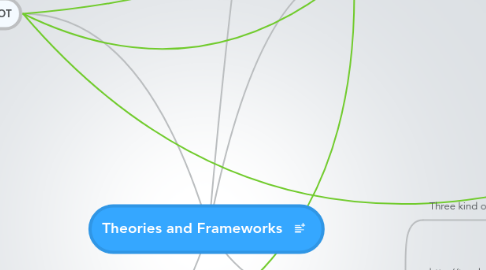
1. SCOT
1.1. Social Construction of Technology
1.2. Human action shapes technology, it does not shape human action
1.3. Used to analyze why a piece of technology was successful or not
1.4. Success or failure of technology is socially determined regardless of how good the technology really is
1.5. Key theorists: Bijker, Pinch
2. Media Ecology
2.1. No single definition
2.2. Study of media as environments
2.3. Technology has very strong influences on society
2.4. Technology affects the way we see the world
2.5. Media Ecology Association
2.6. Looks at how humans/society affect technology as opposed to SCOT where we look at technology being affected by humans
2.7. Key theorists: Postman, McLuhan
3. Learning Theories
3.1. Connectivism
3.1.1. Capacity to know more is more critical than what is currently known
3.1.2. Learning and knowledge rests in diversity of opinions.
3.1.3. Learning is a process of connecting specialized nodes or information sources.
3.1.4. Nurturing and maintaining connections is needed to facilitate continual learning.
3.1.5. Begin with complex problems and teach basic skills while solving these problems
3.1.6. Currency (accurate, up-to-date knowledge) is the intent of all connectivist learning activities.
3.1.7. Ability to see connections between fields, ideas, and concepts is a core skill.
3.1.8. Implications for teachers is that it may take away our role in having children retain new information since they access everything through technology.
3.2. Cognitive Load
3.2.1. Chunking
3.2.2. Learning structures
3.2.3. Instructional design
3.2.4. Error / Fundamental Attribution Error
3.2.5. Implications for teachers is that we may become too focused on knowledge and it is difficult to measure understanding
3.3. Constructivist
3.3.1. Teacher as facilitator
3.3.2. Problem-based learning
3.3.3. Project-based learning
3.3.4. Authentic tasks
3.3.5. learning involves constructing one's own knowledge from one's own experiences
3.3.6. Learning is building connections by actively interacting with the environment
3.3.7. Discovery learning
3.3.8. Case-based learning
3.3.9. Collaborative learning
3.3.10. Active learning
3.3.11. Vygotsky’s Zone of proximal development
3.3.12. The implications for teachers is that it is a time consuming process with students and it is also hard to accurately assess students progress
4. TPACK
4.1. Three kind of knowledge
4.1.1. Content Knowledge
4.1.2. Pedagogical Knowledge
4.1.3. Technology Knowledge
